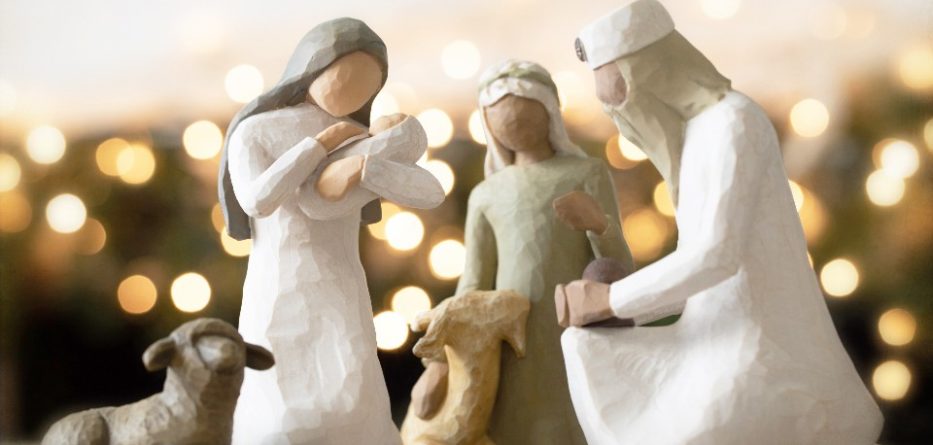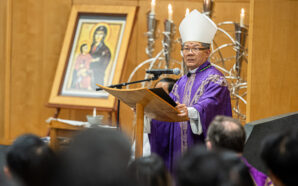Homily for Christmas Day
Readings: Isaiah 9:1-7; Psalm 95; Titus 2:11-14; Luke 2:1-14
25 December 2021
Christmas Blessings to all of us. In Luke’s account of the Christmas event, the angel of the Lord declares to the shepherds: “Today in the town of David a saviour has been born to you; he is Christ the Lord.” Luke and Matthew are the only two gospels to include infancy narratives. For the earliest Christians, “the Christological revelation of Jesus’ identity was attached to the resurrection”. Gradually, Christians “perceived that Jesus did not become the Son of God through the resurrection but was already the Son of God in his public ministry”. Think just of Mark’s account of the baptism of Jesus: “You are my beloved Son.” The great scripture scholar Raymond Brown tells us: “In the Matthean and Lucan infancy narratives (written after Mark’s gospel) the Christological insight is pressed even farther back into the career of Jesus, so that Jesus is presented as God’s son from the moment of his conception in the womb of the virgin Mary.”[1]
Listen at https://soundcloud.com/frank-brennan-6/christmas-homily
In Matthew’s gospel, at the birth of Jesus, there is “a proclamation by a star to the magi” and in Luke’s gospel there is a proclamation “by an angel to the shepherds”. Both shepherds and magi believe immediately and worship without hesitation. But then they disappear – the magi “went away to their own country” and the shepherds ‘returned’ to their fields. We never hear of them again. What became of their professions of faith?
In Luke, there are three groups of participants who witness what is said about the birth of Jesus – the shepherds, those who are astonished at what they hear from the shepherds, and Mary. In Luke as in Matthew, by the time of the public ministry of Jesus, there is “no surrounding chorus of adoring believers, treasuring the memories of the marvels that surrounded the birth at Bethlehem”. ‘Mary is the only adult in the infancy narrative who will last into the public ministry and even into the church.’[2]
At times we are like the shepherds – we hear the message but then we disappear back into our worldly ways as if nothing has changed. At times we are like those who are astonished at the message – we’ve heard it, but don’t know what to make of it. Occasionally we are like Mary, treasuring the message and pondering it in our heart. Christmas is not a time for being hard on ourselves. Jesus comes amongst us and is proclaimed as good news for the shepherds, for those who are astonished, and for those who are Mary.
When Cardinal Pell was in prison on Christmas Day two years ago, he wrote: “This is our faith. This is the faith of the Church. We are proud to profess it everywhere, in palaces and in slums, in great international cities and in deserts and jungles, in St Peter’s, the most famous church in Christendom, and in jail, home of the disgraced and condemned.”[3]
This Christmas, the media has been fascinated that the folk singer Paul Kelly has published a new version of his song How to Make Gravy which describes a prisoner’s communication with family about all that he will miss at Christmas. It’s only by focusing on what we miss at Christmas at times of loss, separation and isolation that we know what we treasure as the core of the Christmas message. Paul included the song on his album of Christmas songs dedicated to his older brother Martin who died this past year. Here’s Paul’s fraternal description of Martin: “He protested against the Vietnam war; he grew his hair long; he was the one playing these weird records – the Moody Blues and Pink Floyd – and bringing new ideas into the house. How to talk about Marty? He was an unusual man. He was religious, had a strong faith, but it was not narrow, it was very broad. He was a deep humanist. That was definitely in the back of my mind putting this record together. I wanted to make a big-hearted, generous, open record”.[4]
During the week I was called to a local hospital for an EOL situation as the professionals describe it – end of life. Outside the patient’s room, I was with the family as we all put on the full anti-COVID PPE – the N95 mask, the face shield, the hair net, the gown and the gloves, disinfecting our hands at every turn. The daughter said to me, “Father, we’re not religious; we just want a blessing”. We gathered around the bed. I offered the prayers of anointing and traced the cross on the patient’s forehead and hands applying the sacramental oil with a cotton bud. I then invited each family member to do the same. The daughter lovingly held her Dad’s head throughout. We prayed for all the family. It was a graced and sacramental moment. As around that hospital bed, so too gathered in the manger, each and every one of us is able to declare at Christmas, “We’re not religious, we just want a blessing.”
Professor Tony Coady has been a long-time parishioner here at Newman College. He recently published an essay entitled: Catholic Identity and Strong Dissent—How Compatible? Considering the interminable debates between so-called progressives and conservatives, Tony says that ‘the vital contemporary question is not whether you identify as a Catholic, or Protestant, or Orthodox, but whether you are a Christian and so shape your life around the central Christian mysteries, such as the Incarnation, the Redemption, the Resurrection, and the urgent moral and spiritual messages of the Gospel.’
Coady says: “This should give rise to a Christian ethic that is informed by such values as the central importance of neighbourly love (where neighbour is understood broadly as in Christ’s parable of the Good Samaritan); the equality of all people as children of God and an associated concept of justice as more than a requirement of local institutions; the crucial importance of the poor and downtrodden as harbingers of God; the pre-eminent demands of peace; and the often mysterious significance of endured suffering.’[5]
He says that “Much of this is perhaps more the province of ethos than codified ethic”.
This Christmas, let’s leave the disputes over codified ethics outside the door of the manger. Let’s join the shepherds imbibing the ethos of the Christ event, identifying those things we have missed most during another year of pandemic and lockdowns, giving thanks that we can celebrate together this day, being big-hearted and generous with each other, admitting that no matter how irreligious or non-religious we might be most of the year, this day we approach the manger declaring, “We just want a blessing.”
The people that walked in darkness
has seen a great light;
on those who live in a land of deep shadow
a light has shone.
For there is a child born for us,
a son given to us
and dominion is laid on his shoulders.
Wide is his dominion
in a peace that has no end.
Whether we classify ourselves as religious or not, like the shepherds, we can return to our flocks knowing that we have been abundantly blessed. Blessings to you and all your loved ones, present and absent, this Christmas.
[1] Raymond Brown, ‘The Meaning of the Manger; the Significance of the Shepherds’, Worship 50 (1976) 528–538, at p. 530
[2] Ibid, p. 538
[3] George Pell, Prison Journal, Volume 3, Apple Books, Week 44
[4] See https://www.theguardian.com/music/2021/dec/21/paul-kelly-on-his-new-version-of-how-to-make-gravy-christmas-music-gets-a-bad-rap
[5] Tony Coady, ‘Catholic Identity and Strong Dissent—How Compatible?’ in David Edmonds (ed.), Philosophers Take on the World, Oxford University Press, 2016, pp. 79-83 at p.82.
Fr Frank Brennan SJ is the Rector of Newman College, Melbourne, and the former CEO of Catholic Social Services Australia (CSSA). He has been appointed a peritus at the Fifth Plenary Council of the Australian Catholic Church.








